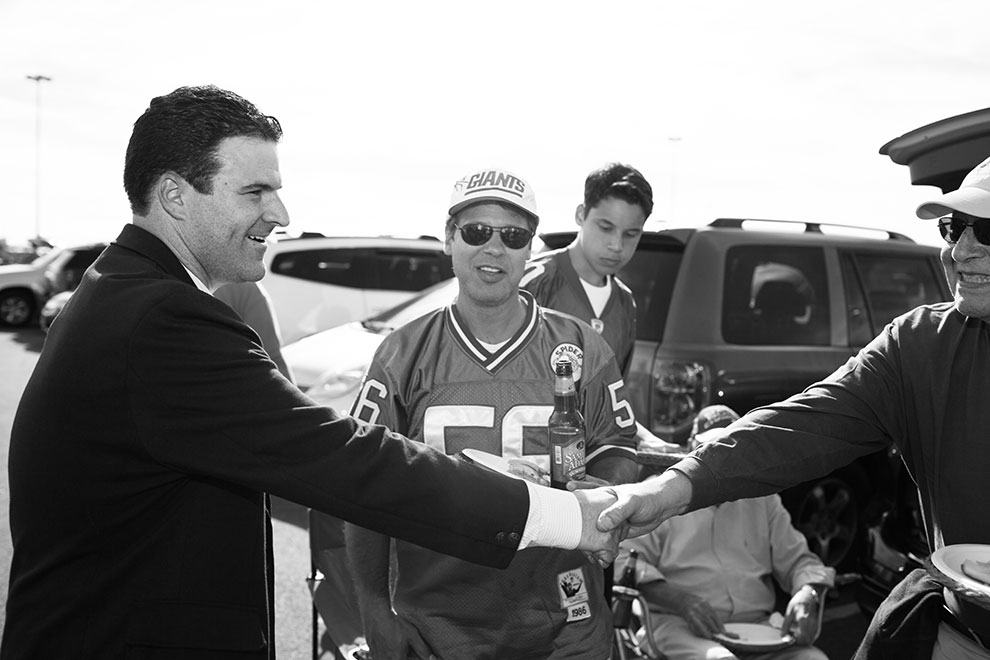The NFL draft has all the drama of an actual football game — intensity, joy, heartbreak, and schadenfreude — except it comes from the reading aloud of names. Thrilling negotiations, shocking resource allocations, sudden changes in the perceived value of 22-year-olds, wins and money achieved and made and lost on paper. It is sports without the sports. It is the Super Bowl of not actually playing football. It is the kind of night Darren Rovell was made for.
The 35-year-old sports business reporter for ESPN strolls the periphery of Radio City Music Hall on this Thursday night in April — the draft has been held at this show business landmark since 2006 — among the rest of the media, yet not exactly part of it. He's wearing a dark suit, the slightest hint of gray in his made-for-television black coif. There are TV crews and makeshift sets and rows of writers with laptops. Rovell finds a place to stand near the center aisle and stares at his phone. Everything he needs is in his shoulder bag: chiefly, a stapled draft-night packet of stats provided by ESPN and three iPhone chargers. "You need to have a good charging strategy," he says. "Have one charger that's only in your bag. When you travel, leave your home ones at home."
The reliability of this phone is crucial; we're just minutes into what will be a long night of hearing names read aloud. Right now the phone contains around 20 scheduled and drafted tweets' worth of intel about the top prospective picks, embargoed new-uniform reveals for the Dolphins and Vikings, trivia about teams' selection histories, and shots of jerseys being printed backstage, which will soon be joined by mockups of rookie cards, everything deployed as needed at key moments over the evening, as well as as 114 unviewed text messages and a not statistically insignificant number of @replies from strangers telling him to die in a fire. He's the self-styled pioneer and proprietor of a staunchly capitalist, social media-driven infotainment machine, and many of the people who read almost every single thing he writes believe he signifies the soul-death of sports.
"I've arranged with the NFL to send me a picture of the name card from the first pick so I can tweet that," he says. "I have to have greater facts that other people won't have. You'll see at 7:15 when the Vikings photo hits, the retweets are going to be crazy."
Darren Rovell, just shy of 400,000 followers strong, does not exist on Twitter alone — his return to ESPN after six years at CNBC includes filing reported stories regularly and shooting non-sports segments for ABC News — but it's what he thinks about, and what people think about when they think about Darren Rovell. (Even his detractors would grant that he's been instrumental in changing the nature of sports reporting.) He will regularly spend hours researching and crafting a single tweet; there are whole Tumblrs devoted to criticizing his online output. He compares what he does to VH1's Pop-up Video, dropping salient, bite-sized business-related footnotes to events we're watching as fans. The often angry reaction thereto speaks to the uneasy relationship between sports' string-pullers and the fans they ostensibly serve, as well as to his own murky relationship to both. (His Twitter background, in case any of this is too subtle: stacks of cash.) He does not profess to be sticking up for the little guy, and yet he firmly considers what he does to be, above all, a public service.
"If people are going to dislike me for commodifying the sports experience, or the idea that I've taken the fun out of it, that's ridiculous," he says. "If you're a fan today and you don't understand the business, then you're a bad fan. You will lose at the watercooler every single time. What's your owner's capacity to spend? You don't know the salary cap? Come on."
Rovell looks back down at his phone. "Hold on, it's 7:14, this Vikings one is going to go out now, I want you to see this." He hits send and…winces. "It's loading. Shit. I don't know if I have a signal."
There is undeniable drama in the sight of almost-grown men, having prepared their whole lives for this very night, witnessing their natural abilities pinned to fluctuating price points, and Rovell is ready for these stories, in his own way. "When [Utah defensive tackle] Star Lotulelei starts slipping, I'm going to try and get in touch with his agent," he says. "I already know he does not have loss-of-value insurance." Loss-of-value insurance is something players can buy to hedge against draft picks — and a potential rookie contract — being lower than projected. (Lotulelei was at one point considered likely to be one of the first few picks in the draft but ended up going "only" 14th. He'd get a $5.365 million signing bonus from the Carolina Panthers.) Darren Rovell believes, evangelically, that if you care about professional football, it is only logical that you should care about loss-of-value insurance.
Rovell is dispassionate about athletes' volatile fortunes, and takes palpable satisfaction in being able to attach a particular number to a particular human condition before anyone else can even think to make the association. This very impulse conflicts directly with the way we feel about sports, or the way we think we want to feel about sports, and plays no small part in why he evokes such strong reactions even among fans who do understand their owner's capacity to add salary within the restrictions of the collective bargaining agreement. These deadpan footnotes, timed just so — to perfect games, to tragedy — feel like pinpricks to the inflated emotions inherent to sports, and that's no accident. They can often feel misguided, but not, it should be said, consciously mean-spirited. Rovell is simply the guy already thinking about the monetary rewards while the rest of us are still processing the thrill of victory or agony of defeat.
Which is not to say that Rovell doesn't have a fan's fervor — it's just usually reserved for things that people sitting at home watching a game generally don't get fervent about. If he's in the locker room after a game, he's cornering agents and scoping out marketing reps with his back to the players. "There's not many who do what I do, and that makes people uncomfortable," he says. "I'm taking a picture of the shoes while everyone else is talking about the game." It's a little like winning the golden ticket to Willy Wonka's chocolate factory and then rushing straight to check out accounts payable. But hey, without accounts payable, the chocolate factory gets foreclosed.
Rovell spots M&Ms and Gatorade on many of the tables set up for the draft-night media and wonders aloud whether that's paid placement. No detail is too mundane to deconstruct. He often relies on his followers for this kind of recon, about arena concessions or merchandise all over the country. "I think I've trained people to be mini sports reporters; they know what I want. Half my content is someone in Topeka, Kansas, who saw a soda display. I'm the conduit, I'll give you credit."
The next object of his ever-shifting attention is University of Tennessee wide receiver Cordarrelle Patterson, currently making the rounds decked out in a white tuxedo. He texts Patterson's agent to ask whether the suit was paid for and who made it. Moments later, his phone buzzes. "There you go: The tux is from Alba and it was custom-made and it was free. This could piss people off. Do I wait until he comes out for his pick or do I tweet it now? He might go 20th. He's wearing a belt and suspenders. I think I'm going to wait."
NFL commissioner Roger Goodell steps to the podium to boos from the mezzanine. (As the face of the NFL's corporate aspects, Goodell is subject to the same kind of disdain as Rovell.)
The Chiefs select Central Michigan offensive tackle Eric Fisher first, and the draft is officially underway, continuing with a litany of low-risk, low-wattage linemen dominating the first round. After the Eagles take Lane Johnson fourth, Rovell checks something against his stats packet and taps out a tweet about how the first four picks weigh a combined 1,162 pounds. He hits send and watches the replies.
"If I don't look at my comments, I'm not doing a good job," he says, scrolling through and rattling off representative examples of praise and pillory: ("'Isn't he the best? When you're looking for stats that include large numbers, look no further than Darren Rovell.'")
"Social media is a dialogue and if I avoid the mentions, it's a monologue. If your journalism isn't the wisdom of crowds, it's a wall." He lingers on one response.
"'Maybe the most Rovellian tweet of all time,'" he reads, smiling. "I know that. I know that."
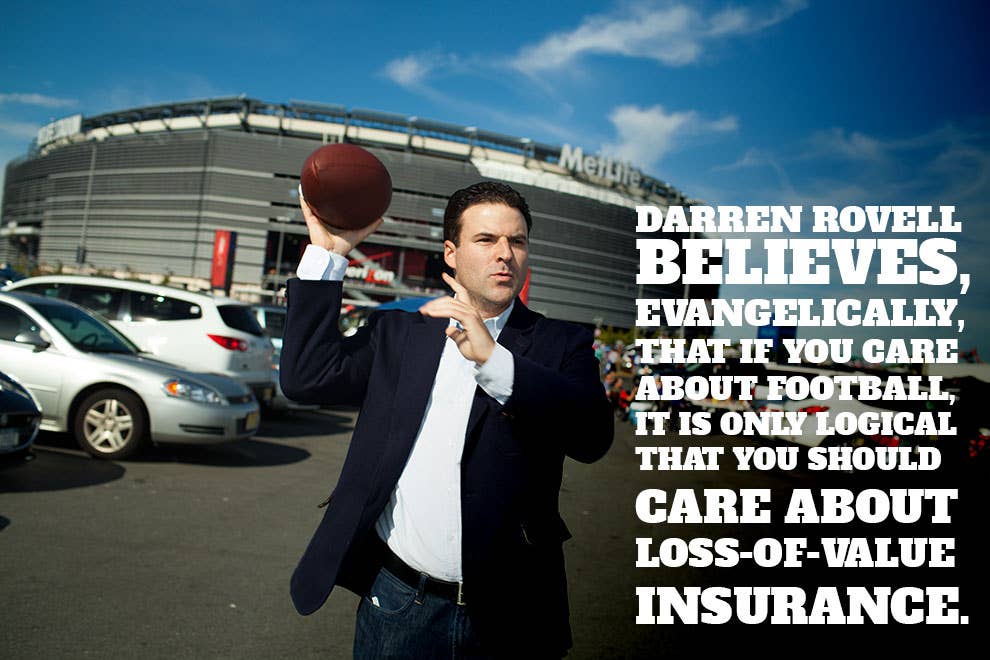
The fact that "Rovellian" is a recognized part of the vernacular in 2013 says a lot about the ubiquity of his presence; the term is usually delivered with an implied eye roll, faux-exhausted bemusement at some picayune observation ostensibly ancillary to anything anyone would give a shit about. But no one understands better than Darren Rovell that if anything's been named after you, you are probably doing well for yourself.
And just as premier athletes feel that they were born to play the game, Rovell believes that his life's calling is, to some degree, manifest destiny. Raised in Roslyn, Long Island, the son of a medical consulting company exec and a now-retired Spanish teacher, he graduated Northwestern in 2000 just at the peak of the first dot-com bubble, and the year Alex Rodriguez signed with the Texas Rangers for $252 million. He was the sports director of the radio station at school, but majored in theater rather than journalism because he thought it would be better practice for TV.
Rovell started doing a sports business radio show his junior year — "I don't think anyone listened, maybe my mom and a couple other people" — building a Rolodex full of team executives and agents and CEOs. After the Packers fired Ray Rhodes as head coach in January 2000, he got Jesse Jackson on his show to talk about whether the move was racially motivated and was summarily profiled by the school paper. (Tommy Craggs, editor of Deadspin, was a year behind Rovell at Northwestern and remembers him, not without affection, as a "sports radio dork" wearing purple blazers — the school's color — at football games.) Rovell interned at Fox Sports' website trying to sell them on the idea of business stories, then met ESPN's David Albright, who was visiting Northwestern on an editorial recruiting trip, the spring of his senior year.
"I had a full agenda of candidates to meet, each one scheduled for 30 minutes," remembers Albright. "Darren came in and told me he had no interest in the positions I was looking to fill, but asked me to give him five minutes to make a pitch. If I liked it, we could keep talking, and if I didn't, then I would get back 25 minutes of my day. Rather than a standard résumé, Darren handed me a media guide — spiral-bound and laminated — that broke down his experience, interests, and included his interview availability on the back cover."
"I printed out the headlines from ESPN.com, and three out of seven of them on that day had dollar signs in them," says Rovell. "All the stories were written by different people, I think all AP. I said, 'If ESPN wants to be the worldwide leader in sports, why wouldn't you want to be the worldwide leader in sports business?' Ten days after I graduated, I was in Bristol." (As in ESPN's Bristol, Conn. headquarters.)
ESPN Vice President of Digital and Print Media John Kosner remembers seeing Rovell during those early days, standing out in the infamously fratty-casual offices by wearing a tie daily. "I felt sorry for him," Kosner says. "I just thought, Wow, there's not a big market for this information and everyone who works here wants to cover the NFL or baseball. And he just outworked everybody in the industry." By 2006, Rovell had left for CNBC, where he was also something of an odd man out — not for wearing a tie, but for reporting exclusively about sports-related stories — and briefly had his own show, Sports Biz With Darren Rovell.
It was during his run at CNBC — and not remotely coincidentally, during Twitter's rise — that Rovell started figuring out the art of making himself bigger than his job. He insisted, via sheer force of personality, that marketing and bean-counting and general corporate influence should be intrinsic to the sports conversation at large, not a sidebar, and that he would be the subject's ambassador and enforcer via this burgeoning medium that many of his peers and employers considered, at least at first, confounding and stupid. He sang the national anthem — and "O, Canada" to boot — before a Rays-Blue Jays game in Tampa in 2011 with his Twitter handle on the back of his jersey. A heel was born.
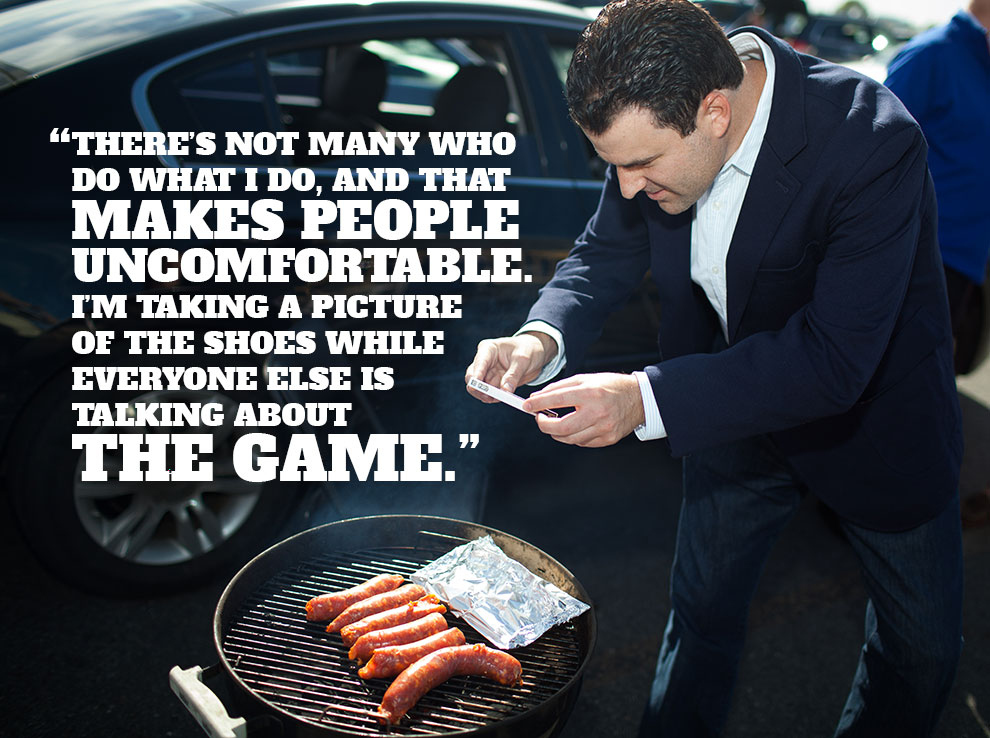
Drawing particular scorn was a story Rovell did in November 2011, crowdsourcing his followers for suggestions about people or businesses who were losing money during the NBA lockout. He reported out a tip from a reader who claimed his New York escort service had taken a major hit. When the tipster revealed himself to Deadspin as a teenager out to humiliate Rovell, CNBC was forced to retract the story, and Rovell fell on his sword, apologizing and lamenting that the prankery would ultimately just be a disservice to his fans: "As a result I will do fewer stories on the real life impact of big events which I do think the public enjoys. There will always be people out there who want their 15 minutes of fame and not really care how they get there." (Today, Rovell is sanguine about getting duped. "You get things wrong in your career few and far between," he says, "and that always comes up a gazillion times.")
He became the scourge of sports journalists and media watchdogs, chief among them Richard Deitsch, media columnist for Sports Illustrated, who regularly takes issue with specific points and tactics and perceived ethical conflicts as much as simply with Rovell's inherent Rovellianness. (Deitsch declined to be interviewed for this story.) SBNation writer and Sacramento Kings devotee Tom Ziller got into it with him earlier this year when it looked like the Kings might have to leave for Seattle; Rovell questioned whether the fanbase was strong enough to support the franchise, Ziller accused Rovell of doctoring a quote to support his thesis. ("You know Tom Ziller is not his real name?" Rovell says. "The NBA looked into it. I totally understand how horrible it must be to have to find a job somewhere else, but my job is to talk reality.")
Rovell returned to ESPN last summer; he won't say how much his contract is worth (speculation starts at around $500,000), only that it was more than CNBC and CNN offered, much to the dismay of people who take him to task for regularly tweeting about athletes' salaries and real-estate transactions. (ESPN officials also declined to specify.) He has a separate contract with ABC News to report non-sports business stories about subjects like the food industry and the sneaker industry.
An ex-CNBC colleague who insisted on anonymity believes the embarrassment of having to retract the escort-service story was not only a huge black eye for the straight-laced financial news network, but a reminder that journalists' reputations are — or, rather, should be — built on breaking big stories and not tossing out minutiae to the masses. "When 99% of your stuff is that, it does call into question your chops as a reporter. I think if he was smart, he'd go out there and focus on some significant stories."
The bulk of the venom is still reserved for Rovell's general worldview rather than any specific infraction. Deadspin founder and current Sports on Earth senior writer Will Leitch laid out the case against Rovell early this year, largely featuring testimony from anonymous scolds. Leitch, for one, signs his name to his gripes, which have less to do with Rovell's insistence that sports and commerce must be inextricably intertwined — this, by now, is, or should be, beyond debate — than with his presumption that the average sports fan should be enthralled by this rather than resigned. And that Rovell's reporting, no matter how well sourced or researched or impeccably timed or concisely packaged, feels like nothing more than spiking the ball in the end zone.
"I personally like the guy, but let's be clear: I do think he represents bad," Leitch says. "Sure, cancel the World Series, we'll come back. Raise ticket prices, black out the games we want to watch, we're going to keep coming back; sports fans are battered spouses in a lot of ways. So to see someone who seems to represent specifically that interest, who seems to have more inherent trust in press releases and official statements from corporations and institutions in power, I think that's infuriating to fans because we don't trust them at all. He has an insight to them, he talks to them — we want someone like him to be more on our side than he is."
Tommy Craggs takes this line even further, singling out Rovell's reporting during labor disputes. (During last year's NHL lockout, he referred to the league's 2004–05 decision to lock players out for an entire season as "genius" in paving the way for commissioners to take drastic action without losing fans.) "This is where I think his poison has a real effect," he says. "Outside of baseball, players will never win a labor dispute; the deck is stacked. But when you have someone amplifying the viewpoints of the power structure — and he's doing this now at the biggest amplifier of them all — this has real effects on actual human beings. Darren Rovell may not see them as actual human beings, but there are people who are harmed by this. It's not just fun and games and doing stunts with Mark Cuban at Dairy Queen, it fundamentally changes sports. And there's no deviousness there — he's the world's purest shill."
Rovell has heard it all. He cites his criticism of the NBA for charging for tickets to the draft as an example of his willingness to speak truth to power when warranted, yet ultimately, he's a business reporter, full stop, and the fact that games are involved is incidental. "I'm not so money-minded that I let everything pass," he says. "Am I more likely to be on the side of pro-business? Of course." No late-night change of heart is forthcoming; the criticism will continue at varying degrees of pitch, he will continue to be a punching bag. The trick then is learning how to take the punches.
"You can't argue with everyone who wants to pick a fight," he says. But some fights he believes are worth having, even — or especially — if he knows he's going to lose. A Chicago sports blog called Barstool Sports is a frequent tormentor, and its author, known only as "Big Cat," challenged Rovell to a one-on-one basketball game. So in August, right after Rovell sang "Take Me Out to the Ballgame" at Wrigley Field during the 7th inning stretch on the Cubs' Social Media Night (it is too a thing), he drove across town, with his father in tow, and got shellacked 11-0.
"I knew I'd get killed," Rovell says, smiling. "He had six inches on me and 60 pounds. And I suck at basketball. I'm good at tennis. He didn't think I'd do it, none of his followers thought I'd do it. Even my dad didn't understand — he said, 'You're going to be embarrassed.' I told him, 'You don't understand, this is good for my brand.' And I can't imagine how many of this guy's people said, 'Wow, it's just not fun to bash you anymore." I turned it. I'm not this ESPN guy who sits in his high tower. I see you. I got ya. And I'll engage with you, let's go. Embrace the hate. The question is, why? Why embrace that?"
"It's so evil," says Craggs. "He's not just a management stooge, he's a self-aware management stooge. "
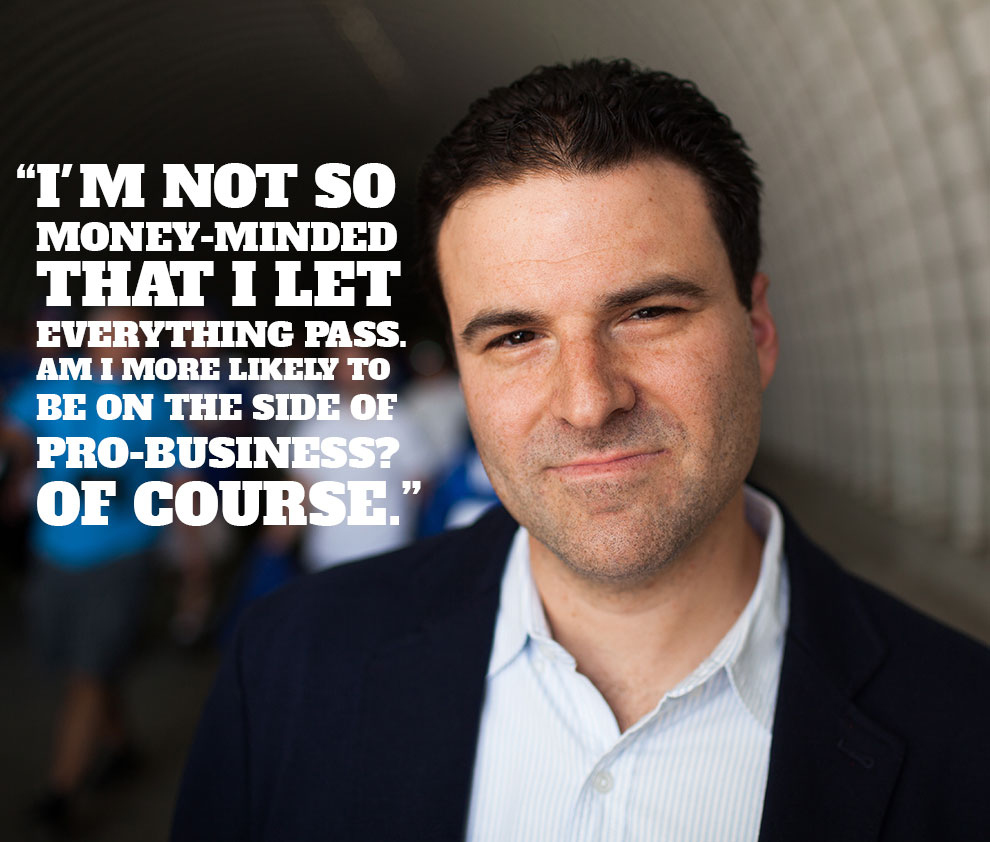
They're moving to a new, bigger house soon, but Rovell currently lives with his wife Cortney and 1½-year-old daughter Harper in a gated community in Livingston, New Jersey, where all the streets are named after famous golf courses. The basement of this house is the "mancave" he infamously fretted for during Hurricane Sandy last year, albeit a mancave that's currently half full of children's toys and dollhouses. In the new house, there will be a separate playroom.
On a humid morning in August, ESPN's Colin Cowherd is on the big screen, mercifully muted while Rovell, dressed down in a collared shirt and baggy jeans, checks his Twitter analytics to see which of his recent tweets got the most traction. (He later emails me a screenshot showing 71,500 mentions over 30 days.) "I don't really watch, I just have Colin or Mike and Mike on in the background, because if something happens, I know I have to work on the secondary story right away." ESPN itself is one of the biggest stories in sports right now, having just backed out of its participation in a Frontline documentary about concussions in the NFL, a move that reeked of caving to pressure from a league which is, of course, one of ESPN's most important broadcast partners. Rovell — a company man in every meaning of the phrase — appears genuinely shocked by the decision but does not want to delve deeper. "I will say that in my experience over seven years, there has always been church and state."
Cortney and Harper are out for the morning at the bookstore — while Rovell is more than happy to court attention, he says he wants to keep them out of it, although he announced his daughter's birth by boasting that he'd already registered her Twitter account (@harperrovell).
"I did that to protect her intellectual capital," he says. "Yes, I did announce it on Twitter, and I knew what doing something like that would invite. But she doesn't really tweet."
"Well, she's a year-and-a-half old," I say.
He raises an eyebrow. "Lance Armstrong's 6-month-old is tweeting."
The walls of the basement are adorned with Northwestern football helmets and signed footballs and jerseys in glass display cases — something he points to when accused of being disconnected from the mentality of the true fan. He went to Northwestern because his dad is from Illinois and gave him a Northwestern hat when he was 9, but also because it felt counterintuitive for a kid from Long Island. He calls himself a "niche guy"; as a kid, he was a Nets fan when everyone else was a Knicks fan, and going to this Midwestern school felt like a similar move. The Emmy he won for being a part of CNBC's 2008 election coverage sits on a side table next to the couch. He is online and on call save for 5:00 p.m. to 7:00 p.m. for Harper time — unless the incoming call is from Bristol, he stays away from the phone.
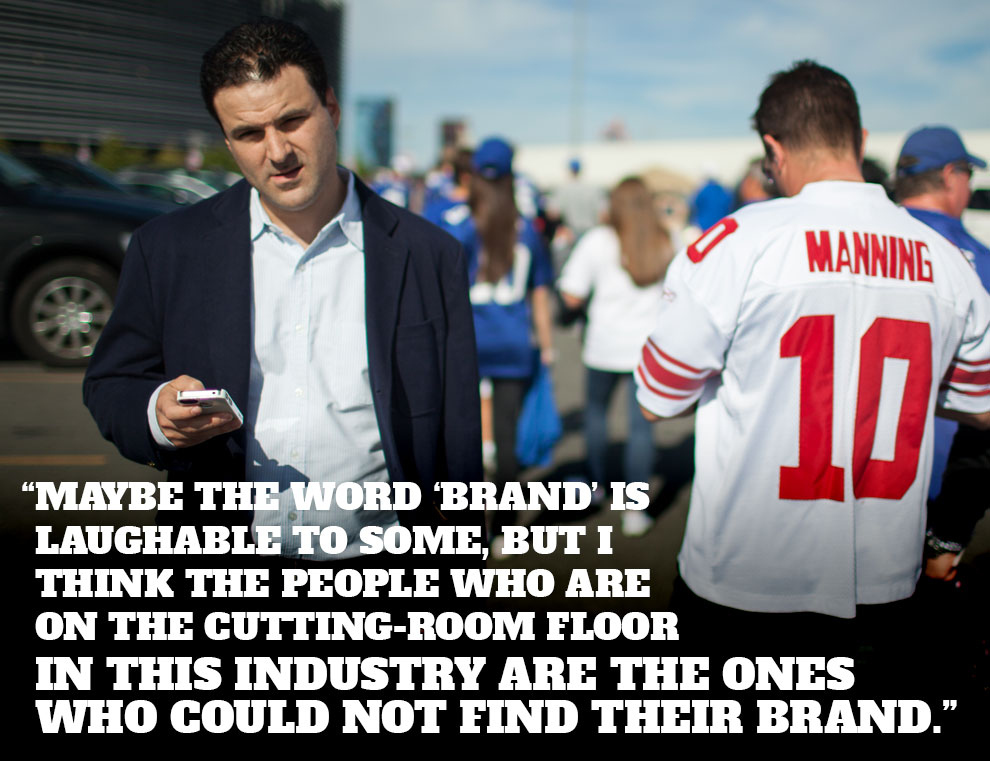
Rovell has been consumed all summer with what he considers to be the biggest story of his career, and unsurprisingly, it centers around the sports memorabilia industry, the nexus where fandom and commerce collide most awkwardly. In early August, Rovell reported, along with ESPN's Justine Gubar, for ESPN's Outside the Lines that sophomore Texas A&M quarterback Johnny Manziel was being investigated by the NCAA for getting paid by memorabilia dealers to sign autographs. While hardly a jailable offense, and possibly downright quaint in the grand scheme of things, the story did raise the volume on the ongoing discussion about the way everyone involved with college sports stands to make money except for the actual athletes, particularly the ones most chiefly responsible for generating revenue. (Manziel won the Heisman Trophy last year.)
For Rovell, this not only helps prove that he's capable of thinking in more than 140 characters at a time, it plays into his mission to educate the populace about how arcane financial stipulations and bylaws affect what happens on the field, whether they like it or not. About the complexities of Title IX and why paying players, while fair in theory, would be difficult to execute, and the economics of college jersey sales. Of course there were fans and boosters who didn't understand why Manziel was singled out, or thought that this was nothing more than snitching on a star who deserved to be making money somehow.
"I know the memorabilia world, I've always been interested in it," he says. "I probably gravitate to that more than stories about taxes or insurance or whatever. I thought I was going to pay for college with my 1989 Ken Griffey, Jr. Upper Deck card. You gravitate towards stories you enjoy. I saw some [Texas A&M] blog that showed the percentage of my tweets that are about Manziel and suggested that I'm obsessed. No. This is me following through in the new-media type of way; I have an edge and I'm going to keep pounding it like a good reporter should. My job is to finish out the story, not leave scraps for someone else."
Texas A&M's chancellor, John Sharp, called out Rovell personally in an email screed to supporters, referring to the escort story as evidence of Rovell's shoddy journalistic practices. But this time, even Deadspin defended Rovell's work, pointing out that Rovell's personality and history didn't have anything to do with the actual facts he and Gubar reported and summarily had corroborated by numerous sources. If Rovell's reputation means he's more likely to be underestimated, that's a challenge he accepts.
"You are a collection of your work," he says. "And maybe the word 'brand' is laughable to some people, but I think the people who are on the cutting-room floor in this industry are the ones who could not find their brand, who were not any more than what they wrote." The phone rings — Cortney is on her way home.
"I want to get something for you." He steps over to a closet and pulls out a plastic bag containing yellowed magazine clippings. For years, he has gone through back issues of Sports Illustrated and the like and cut out noteworthy ads and business-related stories, partially to put what he does into context — he often tweets out choice selections — but mostly because this is all just something he likes.
"This is an awesome 1984 Coke ad," he says, shuffling through the torn pages excitedly. "This article is from 1968 — look how many dollar signs there are in there. From 1975, 'Recruiting Crime: Agents, Coaches Swing Sweetheart Deal to Corral High School Stars.' This has been going on forever. Look at this: Sports Illustrated, 1986: 'Why TV Is Killing Sports.'"
For all of his protestations that he's a reporter doing his job and covering his beat, ultimately this really is all as simple as a guy gravitating toward something he enjoys. He'd rather talk about branding than stats. He cares more about earning potential than personal narrative. He is a crazy fan, but of conspicuous consumption. And he's honest about this, which is perhaps more than can be said of the people he covers.
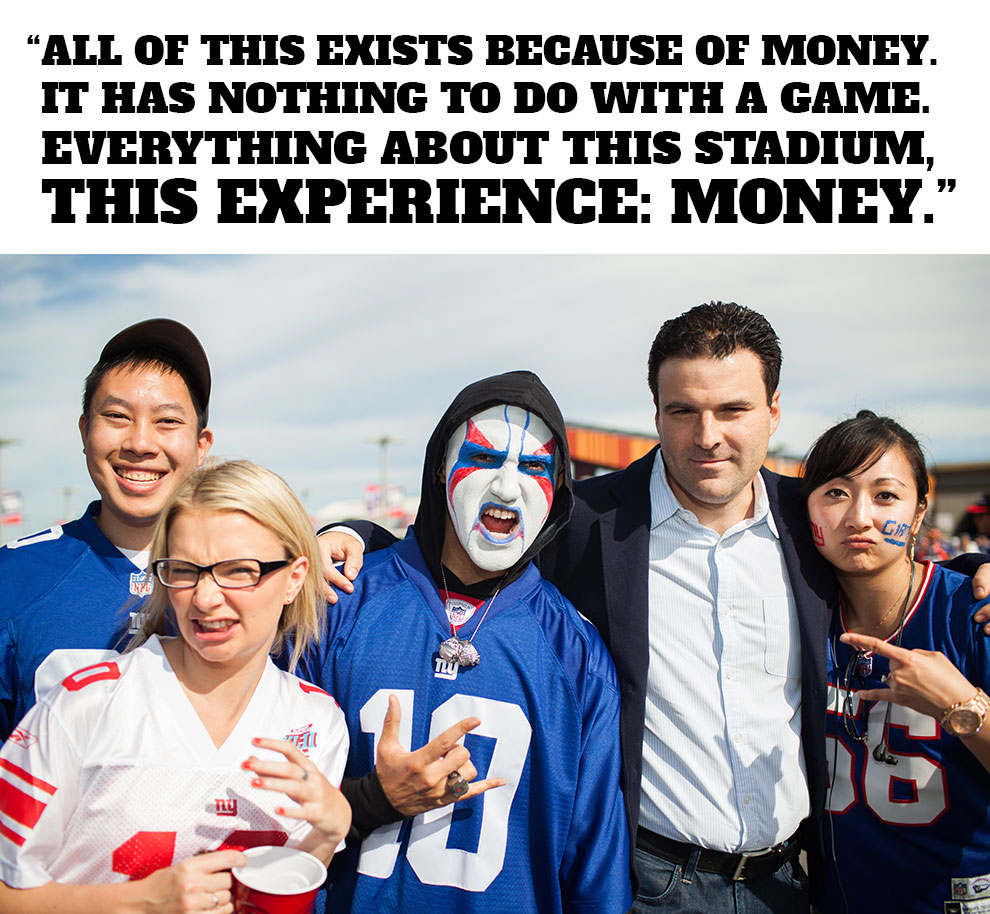
It's a sunny, brisk mid-September afternoon, and the parking lot surrounding MetLife Stadium, hyper-branded house of football and commerce, is bustling with tailgaters who've been drinking in the sun all day. Rovell is going to watch the Giants-Broncos game — the Manning Bowl, pitting Eli vs. Peyton — from the Pepsi suite, and he's excited to get some face time with CEO Indra Nooyi. (The next day, Rovell will tweet that he "cherished" the opportunity to talk to her about the company's many, many brands.)
He stops no fewer than two jersey-clad Giants fans to tell them they're wearing Chinese knockoffs. He poses with a fan in face paint. He doesn't react to the guy shouting, "Hey, you're Darren Rovell! The worst person in the world!" But he probably heard it.
Rovell would be just as happy to watch this game and the rest of the day's games from the comfort of his mancave, but he braved the traffic and the tumult for a little face time with a beverage-industry overlord, to get a little closer to the motherboard of the whole machine. Behind him in the distance is a Verizon logo, a story high, adorning the stadium's Verizon Gate entrance.
I ask him what is it about the business side of sports — aside from the fact that it's allowing him to fill a void in journalism, aside from being a place where he can render himself a scoundrel to carve out a niche in a social media-driven landscape — that he genuinely loves. This isn't merely about the business of sports, it's business as sport, and to Rovell, he who dies with the most toys actually does win. There is an enthusiasm and ebullience that can't be attributed to sheer careerism. There has to be more to this than just strategy.
He smiles. "My whole life is a strategy."
Rovell is headed to work. He walks toward the Verizon Gate, making his way to the Pepsi suite, a lion among the sheep. "All of this exists because of money," he says, neither gleefully nor ruefully, taking in the scene. "It has nothing to do with a game. Everything about this stadium, this experience. Money."
